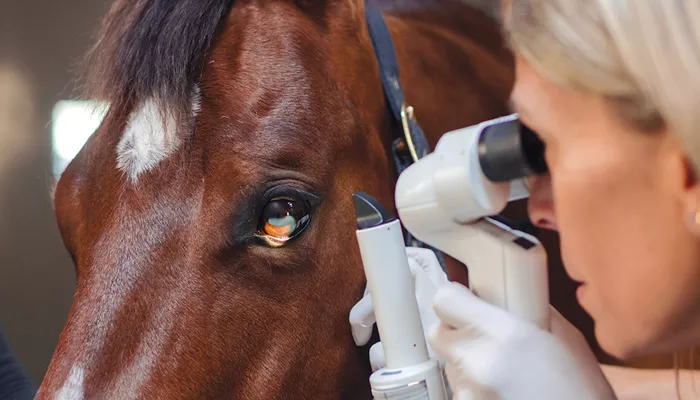A team of researchers is making strides toward preventing blindness in horses with a new treatment for equine recurrent autoimmune uveitis, a condition that can leave horses unable to see. Their breakthrough could also have implications for human health.
A recent study published in Frontiers in Immunology details the development of an eye drop designed to combat the sight-robbing effects of uveitis, which is the leading cause of blindness in horses. The researchers have focused on finding a way to both protect and restore vision for horses suffering from this painful disease.
Uveitis is a significant health concern, causing around 10% of blindness and visual impairment in the U.S. alone, affecting approximately 30,000 individuals each year, according to the Cleveland Clinic. The condition occurs when the uvea—the middle layer of the eye—becomes inflamed, which can either cause structural breakdowns in the eye or block light from reaching the retina, resulting in vision loss. If caught early, medication can help prevent the worst effects of uveitis, but once the condition has progressed, it can be too late to reverse the damage.
Lauren Stewart Stafford, a former Ph.D. student in microbiology at the University of Florida’s Institute of Food and Agricultural Sciences (UF/IFAS), who is now a postdoctoral researcher at Case Western Reserve University, explains that the damage caused by uveitis is irreversible in its advanced stages. “If it’s caught early, it can be controlled, but in later stages, the damage is often already done,” she says.
While the disease’s effects on horses and humans are similar, researchers believe that the new treatment could be effective for both. “It turns out that the drug acts on the same part of the eye in both species,” said Joseph Larkin, an associate professor at UF/IFAS, who is involved in the study. “If we can prove its efficacy in horses, we could also use it to treat humans.”
Traditionally, steroids have been the go-to treatment for uveitis, but their long-term use is not ideal due to various side effects. Recurrent uveitis, which reappears after treatment, necessitates a more sustainable solution. This new eye drop treatment takes an autoimmune approach, targeting the immune cells that destroy the structures inside the eye, which is a hallmark of autoimmune uveitis.
The drops contain a synthetic molecule known as a SOCS1-KIR mimetic peptide, which mimics a protein building block involved in various therapeutic treatments. This peptide regulates the chemical signaling between immune cells to reduce inflammation and potentially improve cell communication. In a previous study, the researchers demonstrated the treatment’s potential effectiveness at the University of Florida’s College of Veterinary Medicine.
Several horses involved in the study were suffering from light sensitivity and had lost most or all of their vision. After treatment, many showed significant improvements, with one horse even regaining some of its sight. “Once we reduced the inflammation, one horse was even able to see again,” Larkin said.
The next step, Larkin noted, is to conduct a clinical trial to further explore how this treatment can help horses and, ultimately, people. The research was funded by the Grayson-Jockey Club Research Foundation, a non-profit organization dedicated to supporting equine veterinary research.
This promising treatment may not only change the lives of horses affected by uveitis but could also offer hope to humans suffering from similar eye conditions.
Related topic:
Christy Carlson Romano Reveals Close Call After Being Shot in the Eye
Myopia Surge: Early Detection and Treatment Key to Preventing Vision Loss
Shraddha Eye Care Trust Launches Ophthalmic Wing at Sunday Village Clinic

